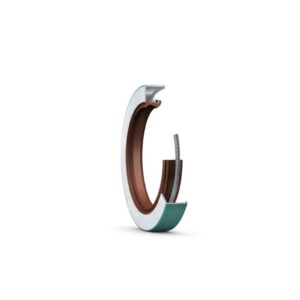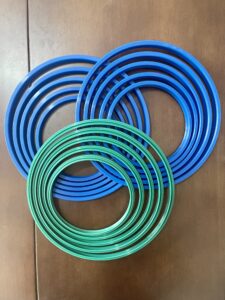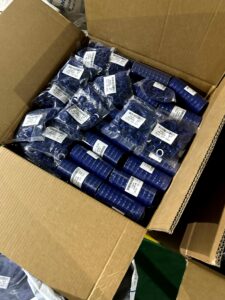Comprehensive Guide to Rear Main Oil Seal, Seal Oil Pump, SKF Oil Seal, 7.3 Oil Cooler Seal Kit, and National Oil Seal Cross Reference by Part Number
Oil seals play a pivotal role in sealing rotating shafts, preventing fluid leaks, and keeping contaminants out. They are integral to the proper functioning of various mechanical systems, including engines, hydraulic pumps, and industrial machinery. In this article, we will explore five crucial keywords: rear main oil seal, seal oil pump, SKF oil seal, 7.3 oil cooler seal kit, and National oil seal cross reference by part number. We will discuss their best-selling models, materials, market trends, development, and pricing information to provide a comprehensive understanding of these essential components.



Table of Contents
Toggle1. Rear Main Oil Seal
Best-Selling Models: The rear main oil seal is used to prevent oil leaks where the crankshaft exits the engine block, playing a vital role in ensuring that oil does not leak from the rear of the engine. Common models include:
-
National 710207: A popular model for passenger vehicles and light trucks.
-
Fel-Pro BS 40600: Known for its excellent sealing performance in a variety of automotive engines.
-
Victor Reinz 71-13006-00: A well-regarded rear main oil seal for heavy-duty applications.
These seals are critical in preventing oil leaks that can lead to engine failure, making them an essential component in engine maintenance.
Market: The rear main oil seal market is primarily driven by the automotive repair industry, with heavy demand from engine overhaul workshops and OEM manufacturers. Additionally, heavy-duty vehicle repair and agriculture machinery maintenance also contribute to the market for rear main oil seals, as these applications often require high-performance seals to handle large volumes of oil.
Materials: Common materials used for rear main oil seals include:
-
Nitrile Rubber (NBR): This is the most commonly used material for rear main oil seals due to its excellent oil resistance and cost-effectiveness.
-
Fluorocarbon Rubber (FKM): Used in higher-performance applications where elevated temperatures or chemical resistance is required.
-
Polyurethane (PU): Used for heavy-duty applications where seals experience high wear and tear.
Development Trends: The market for rear main oil seals is increasingly focusing on improved durability and higher temperature resistance, particularly as newer vehicles and machinery operate at higher temperatures. The rise of electric vehicles (EVs) and hybrid engines is also pushing the development of seals that can handle new types of fluids and lubricants.
Pricing: Rear main oil seals typically range from $5 to $30 depending on the size, material, and application. Premium models for heavy-duty applications can be priced higher.
2. Seal Oil Pump
Best-Selling Models: A seal oil pump is essential for ensuring that oil pumps operate efficiently and do not leak oil. Popular models include:
-
National 710105: A commonly used oil pump seal for automotive applications.
-
Victor Reinz 71-13198-00: Known for its ability to withstand high pressures and temperatures.
-
Fel-Pro BS 40612: A well-known model in the industry, used widely in oil pump applications.
These seals are designed to prevent oil from leaking around the oil pump shaft and are crucial for maintaining proper lubrication and hydraulic pressure in engines and machinery.
Market: The market for oil pump seals is driven by industries such as automotive repair, heavy-duty machinery maintenance, and oil extraction industries. The automotive sector remains the largest consumer of oil pump seals, as oil pumps are integral to the engine’s lubrication system.
Materials: Seal oil pumps are made from a variety of materials based on the operating environment:
-
Nitrile Rubber (NBR): Commonly used in automotive oil pump seals due to its resistance to oils and heat.
-
Fluorocarbon Rubber (FKM): Used for seals in applications requiring high temperature and chemical resistance.
-
EPDM (Ethylene Propylene Diene Monomer): Commonly used for high-performance seals in automotive and industrial applications.
Development Trends: As engines and machinery evolve, there is increasing demand for oil pump seals that can handle higher pressures and varied lubricants. The trend is toward more efficient seals that provide longer lifespans and greater reliability. Electric vehicles (EVs) are also influencing the design of oil pump seals, particularly as the automotive industry shifts toward new lubricants and coolants.
Pricing: Oil pump seals generally range from $3 to $15, with more complex or high-performance models potentially costing more depending on the material and application.
3. SKF Oil Seal
Best-Selling Models: SKF is a leading manufacturer of oil seals known for producing high-quality, reliable seals used across a wide range of applications. Some of their best-selling models include:
-
SKF 16714: A popular seal used in automotive and industrial applications.
-
SKF 3126: Commonly used in heavy-duty machinery.
-
SKF 13801: A model frequently used for hydraulic systems and industrial equipment.
SKF oil seals are widely used in various industries, including automotive, aerospace, and heavy machinery, where high-performance sealing is required.
Market: SKF oil seals have a global market presence, with demand coming from industries such as automotive, aerospace, manufacturing, and oil and gas. SKF’s reputation for high-quality products means that their seals are often the go-to choice for OEM manufacturers and aftermarket suppliers alike.
Materials: SKF oil seals are typically made from:
-
Nitrile Rubber (NBR): Ideal for general-purpose sealing in automotive and industrial applications.
-
Fluorocarbon Rubber (FKM): For high-temperature and chemically resistant applications.
-
Polyurethane (PU): Known for its durability and resistance to wear and abrasion.
Development Trends: SKF is focusing on producing seals that can withstand extreme temperatures, chemicals, and abrasion. With the rise of electric vehicles, SKF has started to develop oil seals that are compatible with new lubricants used in electric and hybrid powertrains. The company is also investing in sustainability, with an increasing focus on eco-friendly materials and longer-lasting seals.
Pricing: SKF oil seals typically range from $5 to $25, depending on the model, material, and application.
4. 7.3 Oil Cooler Seal Kit
Best-Selling Models: The 7.3 oil cooler seal kit is designed specifically for the Ford 7.3L Powerstroke diesel engine, which is widely used in trucks and heavy-duty vehicles. Popular models include:
-
OEM Ford 7.3 Oil Cooler Seal Kit: The original equipment kit used in Ford trucks.
-
BD Diesel 1045521: A high-performance oil cooler seal kit that is compatible with the 7.3L Powerstroke engine.
-
Fel-Pro 35535: A popular aftermarket seal kit designed for the 7.3L diesel engines.
These kits include all the necessary seals for the oil cooler assembly, helping to prevent oil leaks and maintaining the efficiency of the oil cooler.
Market: The 7.3 oil cooler seal kit market is largely driven by the diesel truck and heavy-duty vehicle repair industries. The 7.3L Powerstroke engine is a popular choice for commercial and off-road vehicles, making the demand for oil cooler seal kits strong in both OEM and aftermarket sectors.
Materials: Oil cooler seal kits are typically made from:
-
Nitrile Rubber (NBR): Offers great resistance to oil and is commonly used in diesel engines.
-
Fluorocarbon Rubber (FKM): For high-temperature resistance in oil coolers that operate in extreme conditions.
-
Silicone Rubber (SI): Used in applications where flexibility and resistance to high heat are important.
Development Trends: As diesel engines evolve, the focus is on creating seals that can withstand higher pressures and more demanding temperatures. The trend is also moving toward improved environmental performance, with manufacturers focusing on developing more sustainable materials.
Pricing: The 7.3 oil cooler seal kits typically range from $20 to $50, depending on the brand and the contents of the kit (including the number and type of seals).
5. National Oil Seal Cross Reference by Part Number
Best-Selling Models: The National oil seal cross reference by part number is used to find compatible oil seals across different brands, helping professionals identify the correct seal quickly. Popular cross-references include:
-
National 710207 vs. SKF 16714
-
National 17568 vs. CR 17568
-
National 3800 vs. Timken 3870
-
National 710105 vs. Timken 400231
These part numbers are commonly used in automotive, industrial machinery, and construction applications.
Market: The National oil seal cross reference market has seen significant growth, driven by the increasing use of digital tools and online databases to facilitate easy access to cross-referenced part numbers. The market is growing across automotive repair, heavy-duty machinery maintenance, and industrial equipment sectors, where quick access to compatible replacement seals is crucial.
Materials: The seals found via cross-reference are generally made from:
-
Nitrile Rubber (NBR): Ideal for general-purpose sealing.
-
Fluorocarbon Rubber (FKM): Suitable for high-temperature applications.
-
Polyurethane (PU): Known for its durability and wear resistance in heavy-duty applications.
Development Trends: The demand for digital cross-reference tools is on the rise, as industries increasingly rely on online catalogs to find compatible replacement parts. As AI technology and machine learning improve, these tools will become more accurate and personalized, offering more precise recommendations based on specific needs.
Pricing: Prices for seals found through cross-referencing generally range from $3 to $15, depending on the material and the application.
Conclusion
In conclusion, whether it is for rear main oil seals, seal oil pumps, SKF oil seals, the 7.3 oil cooler seal kit, or National oil seal cross-reference by part number, these essential components are integral to the functioning of a wide range of industries. The trends in the market are leaning towards higher durability, temperature resistance, and eco-friendly materials. With the rise of electric vehicles and advanced machinery, the demand for high-performance, reliable oil seals will continue to grow, with prices varying based on application and material specifications.



Leave A Comment